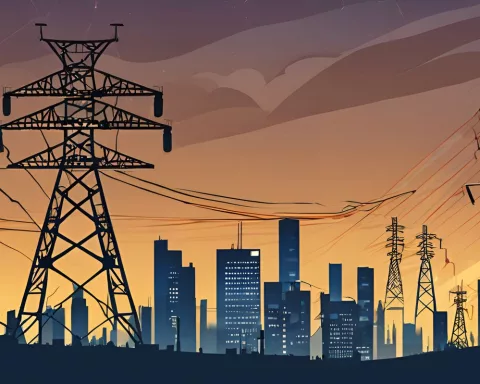South Africans have received temporary relief from Eskom’s load shedding as the power utility has announced a suspension until Wednesday at 4 pm. The cause is credited to Eskom’s sufficient emergency generation reserves and lower-than-anticipated evening peak demand. While some have expressed gratitude for the respite, there is a need for continued efforts to address underlying issues in the country’s energy sector. Nonetheless, the improved performance of Eskom’s power generation fleet provides a glimpse of hope to the ongoing energy crisis in South Africa.
Eskom, the power utility in South Africa, has announced the temporary suspension of load shedding. The suspension is expected to continue until Wednesday at 4 pm, with Stage 1 load shedding resuming in the evenings until Friday. This pattern will continue until further notice, as announced by Eskom.
Mixed Reactions on Social Media
The news of the suspension of load shedding was met with mixed reactions on social media. While some users expressed their gratitude for the temporary relief, others questioned why load shedding was still necessary.
Cause of the Load Shedding Suspension
The suspension of load shedding is attributed to Eskom’s sufficient emergency generation reserves and the lower-than-anticipated evening peak demand. According to Electricity Minister Dr. Kgosientsho Ramokgopa, Eskom’s power generation fleet has demonstrated sustained improved performance over an extended period of time. This has resulted in an increase in planned outages, or “good maintenance,” which has ultimately improved the overall performance capacity, reliability, and efficiency of the fleet.
Positive Improvement in Power Plant Performance
BusinessTech reports that power plants are performing better now than in 2021 and 2022, with a noticeable improvement in breakdowns. As a result, Eskom’s energy availability factor appears to be on a positive trajectory. For the first time this year, projections for total hours of load shedding experienced by the country have fallen under a cumulative 80 hours, currently at 79.6 days.
Load Shedding Schedules
Load shedding schedules for major South African metros are available on the respective city websites, and Eskom has provided schedules for other areas on loadshedding.eskom.co.za.
Temporary Relief for South Africans
The temporary suspension of load shedding comes as a pleasant surprise to the people of South Africa, who have long endured the inconvenience and disruption associated with power cuts. The improved performance of the power generation fleet suggests a potential turning point in South Africa’s energy crisis.
Need for Continued Efforts
However, it is important to remember that the suspension of load shedding is only temporary, and significant challenges remain for Eskom to overcome in order to achieve long-term stability in the country’s power supply. While Eskom’s announcement of the suspension may bring temporary relief to South Africans, it also highlights the need for continued efforts to tackle the underlying issues plaguing the country’s energy sector.
The suspension of load shedding offers a glimpse of hope amidst the ongoing energy crisis in South Africa. While the situation remains far from ideal, the recent improvements in power plant performance and the reduced hours of load shedding suggest that positive change is possible. With continued commitment and effort from both Eskom and the government, South Africa has the potential to overcome its energy challenges and pave the way for a brighter future.
1. What is the cause of the temporary suspension of load shedding in South Africa?
The suspension of load shedding is attributed to Eskom’s sufficient emergency generation reserves and the lower-than-anticipated evening peak demand, as well as improved performance of the power generation fleet.
2. How long will the suspension of load shedding last?
The temporary suspension of load shedding is expected to continue until Wednesday at 4 pm, with Stage 1 load shedding resuming in the evenings until Friday. This pattern will continue until further notice, as announced by Eskom.
3. Are load shedding schedules available for major South African metros?
Yes, load shedding schedules for major South African metros are available on the respective city websites, and Eskom has provided schedules for other areas on loadshedding.eskom.co.za.
4. What is the reaction of South Africans to the suspension of load shedding?
The news of the suspension of load shedding was met with mixed reactions on social media. While some users expressed their gratitude for the temporary relief, others questioned why load shedding was still necessary.
5. Is the suspension of load shedding a permanent solution to South Africa’s energy crisis?
No, the suspension of load shedding is only temporary, and significant challenges remain for Eskom to overcome in order to achieve long-term stability in the country’s power supply. The improved performance of the power generation fleet suggests a potential turning point in South Africa’s energy crisis, but continued efforts are necessary to tackle the underlying issues plaguing the country’s energy sector.












